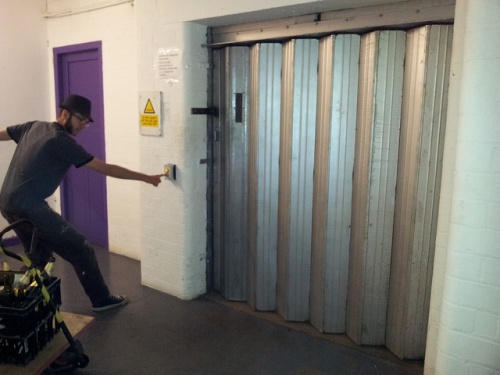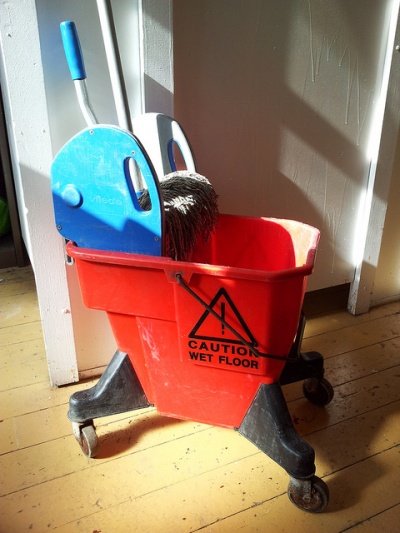Cleaning the hackspace
We now employ a firm of cleaners to visit once a fortnight (Thursday Mornings) to sweep / vacuum / mop / wipe the studio, Kitchen, Bathroom and Blue room and Comfy area.
This cannot extend to dealing with 'piles of stuff' left around - they have been asked to work on the basis that it might be part of a project - hopefully accidents won't happen, but to prevent them...
Nobody is employed to clean the rest of hackspace, so we share the work. If you see any small spills or dirty patches, please clean them up. This page explains how you can get involved.
Realistic expectations
The hackspace is heavily used and sometimes people don't have time to immediately clean up mess, so we don't expect it to be clean at all times. TODO: clarify what our expectations are on cleanliness.
"I hope that keeping things clean will increase respect for the space and encourage people to treat it well" -- 21:02, 10 May 2012 (EST)
How to take out the rubbish
Before throwing stuff away, please be aware of our Waste and Recycling Initiative. The rubbish bins are in the basement. To reach them, go through the back doors of the hackspace and follow the corridor along and around to the right, where you will reach this goods lift:

If the lift is out of action (it often seems to be) there is an external fire-escape staircase down to the basement:
-
go out of the back door of the Hackspace
-
continue straight along the corridor
-
through two sets of double-doors
-
until you get to the exit door on the right-hand side
-
to find the fire-escape staircase to the basement
(this way is not suitable during times of darkness)
Please do not dump rubbish anywhere is the shared / public parts of the building. BizSpace are very strict about this, and charge £50 per 'offence'. Remember you are on CCTV in the public parts of the building!
The wheeled trollies in the Hackspace workshop are useful to shift large amounts of rubbish (when the lift is available).
Mopping the floors
Tips for quick spot cleaning
There is a small (blue) domestic mop and bucket for cleaning small patches. This mop is usually stored in the kitchen. At the moment we don't have any "caution, wet floor" signs, but the large red mop bucket has a "caution" sign on the side, so it can be left out until the spot dries.
Tips for thorough mopping
- Choose a time when few people are around, so the floors have time to dry.
- Fold the tables where possible and stack chairs before you begin (this pays off later).
- (Probably we should put up a "caution, cleaning in progress" sign on the door, but we haven't bothered so far.)
- Use our water heater to boil the water (it is stored above the cupboards in the kitchen). Note: our kettle is small so you would have to wait for it to boil many times.
- We have a big red bucket with castors and a blue wringer (see cleaning equipment).
- We only have one floor cleaning product at the moment (the orange stuff under the kitchen sink) and we're nearly out (21:02, 10 May 2012 (EST)). It is recommended to avoid washing-up liquid, because this can make masses of bubbles and slippery residue that's hard to get off the floor again. TODO: look into appropriate floor cleaning products without bleach.
- This is a recommended mopping technique to clean a large area quickly, and take up most of the water again so it dries quickly:
- TODO: describe technique.
- Important: Only empty the dirty water into the workshop sink, not the kitchen one (for hygiene).
- Important: After you use the mop, squeeze out the water and leave the mop head loose so it can dry. If the mop is left wet it will rot and get smelly.
Cleaning equipment
We have a mop bucket with a Vileda wringer and an SYR InterChange mop handle (920045). These 16oz replacement mop heads should fit our handle:
- SYR No 16 PY Mop (991983)
- SYR No 16 Twine Socket Mop (991986)




